(完整版)Module3TheViolenceofnature知识点,推荐文档
Module3TheViolenceofNature语言点知识梳理

Module 3 The Violence of Nature 语言点学习目标重点单词occur, strike, experience, cause, ruin, bury, affect, warn 重点短语end up, take off, pick up 重点句型现在分词短语作结果状语There is /was the possibility of/that... leave + sth. + 宾补过去分词做后置定语知识讲解重点单词occur【原句回放】Almost all of them occur in the US, in the area from Texas in the southeast to South Dakota in the north. 几乎所有的龙卷风都发生在美国,从东南部的德克萨斯州到北部的南达科他州。
【点拨】occur vi. 发生,出现;(某想法)出现在脑中,被想到。
occur to(想法念头等)想起,浮现,常用于sth. occurs to sb.和it occurs to sb. that ...结构。
That 's the placwehere the accident occurred.那就是肇事地点。
A good idea occurred to me when I came into the classroom. 我进到教室里的时候,突然想起了一个好主意。
It occurred to me that my mother 's birthday was coming.我忽然想母亲的生日快到了。
某人突然想起:Sth. strike sb. that.../ It hit/strikes sb. that...A good idea occurred to/struck me all at once. 突然间我想到了一个好主意。
【拓展】happe n, occur, take place, break out 辨析:happen 表示“发生”时,强调事件发生的偶然性和不可预见性,其主语为事物;表示“碰巧”时,常用于it happened + that-从句或happen to do sth句型中occur 表示“发生”时,属于比较正式的用语,常以具体的事件、事物为主语,此时可以与happen 互换。
外研社版高一英语Module3TheViolenceofNature知识精讲

外研社高一英语Module 3 The Violence of Nature精品学案【本讲教育信息】一. 教学内容:Module 3 The Violence of Nature二. 重难点讲解:1. disaster名词n. 灾难;祸患very bad happeningFires, floods and earthquakes are disasters.火灾、水灾和地震都是灾难。
翻译:We overcame the natural disaster and got in a bumper harvest.a national disastera traffic disastera disaster to sb.某人的灾难2. flood(1)名词n. 洪水a large flow of waterMany houses were destroyed by the flood.许多房屋被洪水冲毁了。
翻译:那场大雨后闹了洪水,我们的家都淹了。
(2)名词n. 大批,大量a lot of somethingI had a flood of letters on my birthday.我生日那天收到一大堆信。
(3)动词v. 淹没,泛滥to fill or cover with waterThe river has flooded a number of villages.洪水淹没了一些村庄。
翻译:春雨期间河水泛滥。
(4)动词v. 充满fill,cover, or overcome, as if with a floodLetters of congratulation flooded in.大批祝贺信像潮水般地涌来。
The room was flooded with moonlight.这房间充满了月光。
翻译:热泪盈眶3. experience(1)不可数名词n.[U] 经验knowing about things because you have done or seen themHe has much experience as an engineer.作为工程师来说,他是富有经验的。
Module3TheviolenceofNature知识点.doc
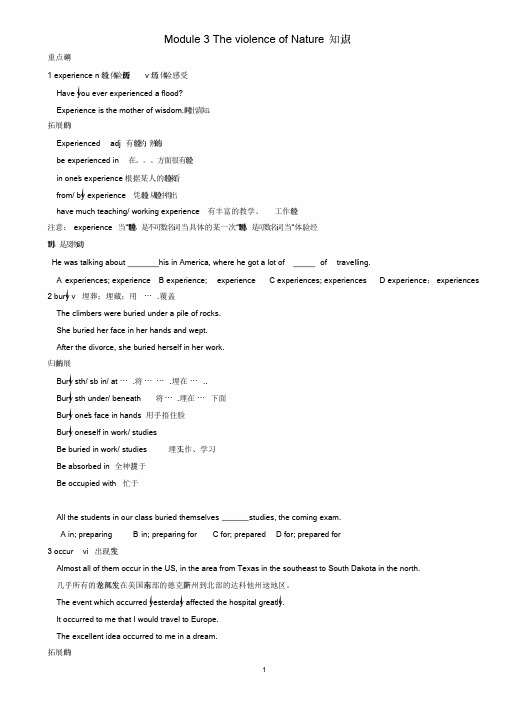
Module 3 The violence of Nature 知识点词重点单1 experience n经验;体验;经历;阅v经历,体验,感受Have you ever experienced a flood?Experience is the mother of wisdom.时间出真知。
纳拓展归Experienced adj 有经验的;熟练的be experienced in 在。
方面很有经验in one’s experience 根据某人的经验来看from/ by experience 凭经验;从经验中得出have much teaching/ working experience 有丰富的教学、工作经验”讲时,是可数名词历,经;当“体验注意:experience 当“经;当具体的某一次“经验”讲时,是不可数名词。
词历”讲时,是及物动He was talking about his in America, where he got a lot of of travelling.A experiences; experienceB experience; experienceC experiences; experiencesD experience;experiences2 bury v 埋葬;埋藏;用⋯.覆盖The climbers were buried under a pile of rocks.She buried her face in her hands and wept.After the divorce, she buried herself in her work.拓展归纳Bury sth/ sb in/ at ⋯.将⋯⋯.埋在⋯..Bury sth under/ beneath 将⋯.埋在⋯下面Bury one’s face in hands 用手捂住脸Bury oneself in work/ studiesBe buried in work/ studies 埋头工作、学习Be absorbed in 全神贯注于Be occupied with 忙于All the students in our class buried themselves studies, the coming exam.A in; preparingB in; preparing forC for; preparedD for; prepared for3 occur vi 出现;发生Almost all of them occur in the US, in the area from Texas in the southeast to South Dakota in the north.生在美国东南部的德克萨斯州到北部的达科他州这一地区。
(整理版高中英语)高一英语《Module3TheViolenceofNature》语法
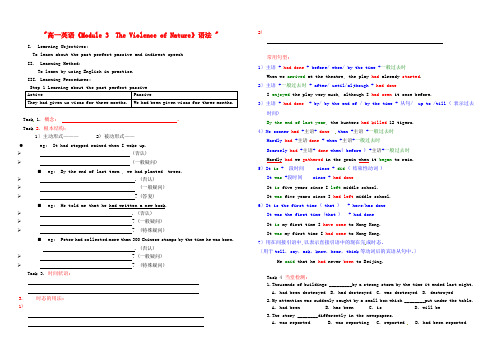
"高一英语《Module 3 The Violence of Nature》语法 "I. Learning Objectives:To learn about the past perfect passive and indirect speechII. Learning Method:To learn by using English in practice.III. Learning Procedures:Step 1 Learning about the past perfect passiveActive PassiveThey had given us visas for three months. We had been given visas for three months.Task 1. 概念: 。
Task 2. 根本结构:1〕主动形式——— 2) 被动形式——●eg: It had stopped rained when I woke up.➢ (否认)➢ (一般疑问)⏹eg: By the end of last term , we had planted trees.➢ . (否认)➢ (一般疑问)➢ ? (答复)⏹eg: He told me that he had written a new book.➢ . (否认)➢ ? (一般疑问)➢ ? (特殊疑问)⏹eg: Peter had collected more than 300 Chinese stamps by the time he was born.. (否认)➢ ? (一般疑问)➢ ? (特殊疑问)Task 3. 时间状语:3.时态的用法:1)2)常用句型:1〕主语 + had done + before/ when/ by the time +一般过去时When we arrived at the theatre, the play had already started.2〕主语 +一般过去时 + after/ until/al though + had doneI enjoyed the play very much, although I had seen it once before.3〕主语 + had done + by/ by the end of / by the time + 从句/ up to /till ( 表示过去时间)By the end of last year, the hunters had killed 12 tigers.4〕No sooner had +主语+ done than +主语 +一般过去时Hardly had +主语done + when +主语+一般过去时Scarcely had +主语+ done when( before ) +主语+一般过去时Hardly had we gathered in the grain when it began to rain.5〕It is + 段时间 since + did ( 结束性动词 )It was +段时间 since + had doneIt is five years since I left middle school.It was five years since I had left middle school.6〕It is the first time ( that ) + have/has doneIt was the first time (that ) + had doneIt is my first time I have come to Hong Kong.It was my first time I had come to Hong Kong.7〕用在间接引语中,以表示直接引语中的现在完成时态。
(完整版)外研版必修3Module3TheViolenceofNature

Module 3 The Violence of NatureⅠ.写作单词——会拼写1.cause vt.引起;导致2.bury vt.埋葬3.occur vi.发生4.ruin vt.毁坏5.damage n.& v. 损失;损害6.warn v. 警告→warning n.警告7.furnish v. 装备;配备→furniture n.家具8.experience vt.经历→experienced adj.有经验的9.violent adj.猛烈的;激烈的;强烈的→violence n.暴力10.thankful adj.感激的→thankfully adv.感激地;满怀感谢地11.sad adj.悲伤的→sadly adv.伤心地;不幸地→sadness n.悲伤12. luck n.运气,好运→ lucky adj.幸运的→luckily adv.幸运地;幸亏13.fortune n.运气→fortunate adj.幸运的→fortunately adv.幸运地;幸亏14.possibility n.可能;可能性→possible adj.可能的→(近义词)likely/probable15.strike vt.& n.(雷电、暴风雨等) 袭击→过去式struck→过去分词stricken/struck16.hope vt.&n. 希望→hopeful adj.满怀希望的;有希望的→hopefully adv.满怀希望地;有希望地17.terrify vt.使惊恐;使受惊吓→terrifying adj.吓人的;可怕的→terrified adj.恐惧的;受惊吓的Ⅱ.阅读单词——要识记18.disaster n.灾难19.flood n.洪水20.hurricane n.飓风21.lightning n.闪电22. column n.柱状物;柱状体23. current n.海流;潮流24. wave n.波浪25. erupt vi.(火山的)爆发;喷发26.previous adj.以前的27.earthquake n.地震28. worldwide adj.全世界的29.active adj.积极的;活跃的高频短语——会默写1.pick up 卷起;掀起;(偶然)学会2.put down 记下;放下;镇压3.take off 去掉;突然成功4.on average 平均起来5.end up 结果为……,以……结束6.set fire to 放火 (焚烧) ……7.catch fire 着火8.put out 扑灭 (火)9.take place 发生10.in all 总共;总计教材原句——会背诵句式仿写——能应用1.They can destroy houses,but leave the furniture inside exactly where it was.(leave+宾语+宾补) 1.把药放在孩子们够不到的地方。
外研版高一必修三 Module3 TheViolence of Nature
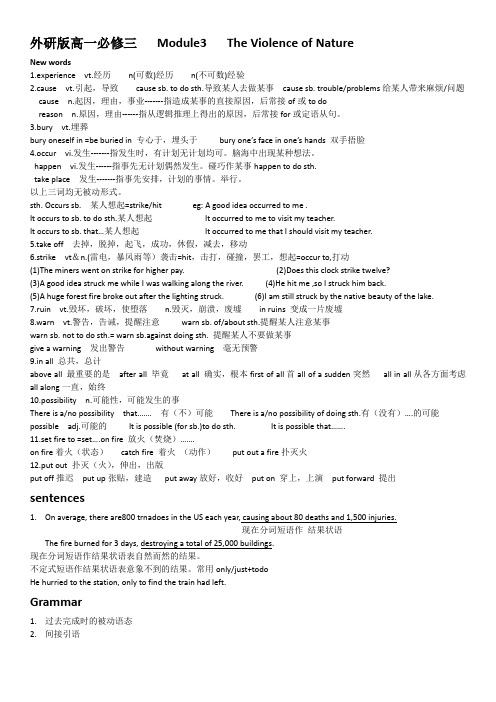
外研版高一必修三Module3 The Violence of NatureNew words1.experience vt.经历n(可数)经历n(不可数)经验2.cause vt.引起,导致cause sb. to do sth.导致某人去做某事cause sb. trouble/problems给某人带来麻烦/问题cause n.起因,理由,事业-------指造成某事的直接原因,后常接of或to doreason n.原因,理由------指从逻辑推理上得出的原因,后常接for或定语从句。
3.bury vt.埋葬bury oneself in =be buried in 专心于,埋头于bury one’s face in one’s hands 双手捂脸4.occur vi.发生-------指发生时,有计划无计划均可。
脑海中出现某种想法。
happen vi.发生------指事先无计划偶然发生。
碰巧作某事happen to do sth.take place 发生-------指事先安排,计划的事情。
举行。
以上三词均无被动形式。
sth. Occurs sb. 某人想起=strike/hit eg: A good idea occurred to me .It occurs to sb. to do sth.某人想起It occurred to me to visit my teacher.It occurs to sb. that…某人想起It occurred to me that I should visit my teacher.5.take off 去掉,脱掉,起飞,成功,休假,减去,移动6.strike vt&n.(雷电,暴风雨等)袭击=hit,击打,碰撞,罢工,想起=occur to,打动(1)The miners went on strike for higher pay. (2)Does this clock strike twelve?(3)A good idea struck me while I was walking along the river. (4)He hit me ,so I struck him back.(5)A huge forest fire broke out after the lighting struck. (6)I am still struck by the native beauty of the lake.7.ruin vt.毁坏,破坏,使堕落n.毁灭,崩溃,废墟in ruins 变成一片废墟8.warn vt.警告,告诫,提醒注意warn sb. of/about sth.提醒某人注意某事warn sb. not to do sth.= warn sb.against doing sth. 提醒某人不要做某事give a warning 发出警告without warning 毫无预警9.in all 总共,总计above all 最重要的是after all 毕竟at all 确实,根本first of all首all of a sudden突然all in all从各方面考虑all along一直,始终10.possibility n.可能性,可能发生的事There is a/no possibility that……. 有(不)可能There is a/no possibility of doing sth.有(没有)….的可能possible adj.可能的It is possible (for sb.)to do sth. It is possible that…….11.set fire to =set….on fire 放火(焚烧)…….on fire着火(状态)catch fire 着火(动作)put out a fire扑灭火12.put out 扑灭(火),伸出,出版put off推迟put up张贴,建造put away放好,收好put on 穿上,上演put forward 提出sentences1.On average, there are800 trnadoes in the US each year, causing about 80 deaths and 1,500 injuries.现在分词短语作结果状语The fire burned for 3 days, destroying a total of 25,000 buildings.现在分词短语作结果状语表自然而然的结果。
Module3 The violence of Nature_知识点
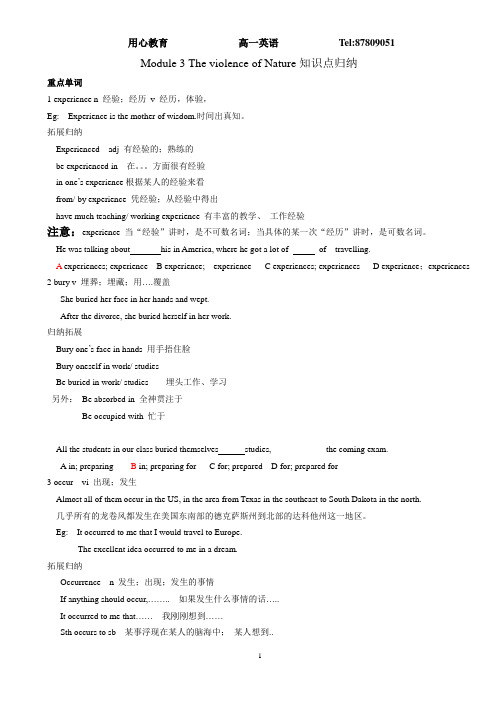
Module 3 The violence of Nature知识点归纳重点单词1 experience n 经验;经历v 经历,体验,Eg: Experience is the mother of wisdom.时间出真知。
拓展归纳Experienced adj 有经验的;熟练的be experienced in 在。
方面很有经验in one’s experience根据某人的经验来看from/ by experience 凭经验;从经验中得出have much teaching/ working experience 有丰富的教学、工作经验注意:experience 当“经验”讲时,是不可数名词;当具体的某一次“经历”讲时,是可数名词。
He was talking about his in America, where he got a lot of of travelling.A experiences; experienceB experience; experienceC experiences; experiencesD experience;experiences2 bury v 埋葬;埋藏;用….覆盖She buried her face in her hands and wept.After the divorce, she buried herself in her work.归纳拓展Bury one’s face in hands 用手捂住脸Bury oneself in work/ studiesBe buried in work/ studies 埋头工作、学习另外:Be absorbed in 全神贯注于Be occupied with 忙于All the students in our class buried themselves studies, ____________the coming exam.A in; preparingB in; preparing forC for; preparedD for; prepared for3 occur vi 出现;发生Almost all of them occur in the US, in the area from Texas in the southeast to South Dakota in the north.几乎所有的龙卷风都发生在美国东南部的德克萨斯州到北部的达科他州这一地区。
Module3 The Violence of Nature Reading

Book 3 Module 3 The Violence of NatureReadingI.背景知识:一、(Natural disaster/Natural hazard)“自然灾害”是人类依赖的自然界中所发生的异常现象,自然灾害对人类社会所造成的危害往往是触目惊心的。
它们之中既有地震、火山爆发、泥石流、海啸、台风、洪水等突发性灾害;也有地面沉降、土地沙漠化、干旱、海岸线变化等在较长时间中才能逐渐显现的渐变性灾害;还有臭氧层变化、水体污染、水土流失、酸雨等人类活动导致的环境灾害。
这些自然灾害和环境破坏之间又有着复杂的相互联系。
人类要从科学的意义上认识这些灾害的发生、发展以及尽可能减小它们所造成的危害,已是国际社会的一个共同主题。
中国自然灾害种类繁多。
地震、台风、暴雨、洪水、内涝、高温、雷电、大雾、灰霾、泥石流、山体滑坡、海啸、道路结冰、龙卷风、冰雹、暴风雪、崩塌、地面塌陷、沙尘暴等等,每年都要在全国和局部地区发生,造成大范围的损害或局部地区的毁灭性打击。
二、(Tornado, hurricane and typhoon)飓风和台风都是指风速达到33米/秒以上的热带气旋,只是因发生的地域不同,才有了不同名称。
出现在西北太平洋和我国南海的强烈热带气旋被称为“台风”;发生在大西洋、加勒比海和北太平洋东部的则称“飓风”。
飓风在一天之内就能释放出惊人的能量。
飓风与龙卷风也不能混淆。
后者的时间很短暂,属于瞬间爆发,最长也不超过数小时。
此外,龙卷风一般是伴随着飓风而产生。
龙卷风最大的特征在于它出现时,往往有一个或数个如同“大象鼻子”样的漏斗状云柱,同时伴随狂风暴雨、雷电或冰雹。
龙卷风经过水面时,能吸水上升形成水柱,然后同云相接,俗称“龙取水”。
经过陆地时,常会卷倒房屋,甚至把人吸卷到空中。
II.在课文中标出下列单词、短语和它们的含义。
1. Texas 得克萨斯州2. South Dakota美国南达科他州3. Missouri 密苏里州4. Illinois 伊利诺伊州5. Indiana 印第安纳州6. the Atlantic Ocean 大西洋7. the Caribbean Sea 加勒比海8. the Gulf of Mexico 墨西哥湾9. Maine 缅因州10. Galveston 加尔维斯顿11. Charles Coghlan 查尔斯.科格伦12. Irish 爱尔兰13. Prince Edward Island 爱德华王子岛课上学案Reading comprehension 阅读理解I. Read What is a Tornado? and try to decide if these sentences are True or False. If they are false, please correct them.(判断正误并改错,并从文中找到对应点)①A tornado is a rotating column of air from a thunderstorm to the ground. ( )②The most violent have winds of 4000 kilometres per hour. ( )③Tornadoes can pick up cars ,trains and even houses and put them down in the next street –or even in the next town. ( )④They can take the feathers off a chicken, but they could n’t destroy houses. ( )⑤On average, there are 800 tornadoes in the UK each year, causing 80 deaths and 1500 injuries. ( )⑥The worst tornado was in 1925 and it killed 2700 people. ( ) II. Read What is a hurricane? and try to answer the following questions .1)What is a hurricane and where do they occur?2) What happens at sea during a hurricane?3) When was the worst hurricane and how many people died in it?B3 Module 3 The Violence of NatureLearning Plan 1 The Gulf Stream &What is a Tornado?目标和要求: 1. 明确词汇的汉语意思、准确读出、并能默写出。
新课标外研社版高中英语必修三教材知识点详解(Module3 The Violence of Nature)
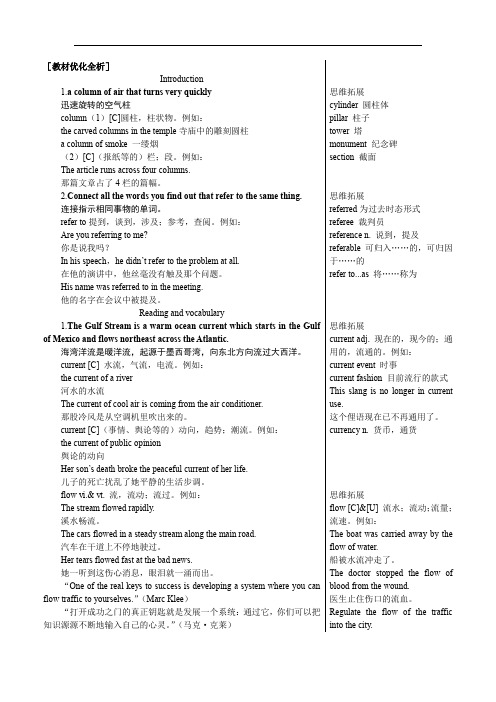
[教材优化全析]Introduction1.a column of air that turns very quickly迅速旋转的空气柱column(1)[C]圆柱,柱状物。
例如:the carved columns in the temple寺庙中的雕刻圆柱a column of smoke 一缕烟(2)[C](报纸等的)栏;段。
例如:The article runs across four columns.那篇文章占了4栏的篇幅。
2.Connect all the words you find out that refer to the same thing.连接指示相同事物的单词。
refer to提到,谈到,涉及;参考,查阅。
例如:Are you referring to me?你是说我吗?In his speech,he didn’t refer to the problem at all.在他的演讲中,他丝毫没有触及那个问题。
His name was referred to in the meeting.他的名字在会议中被提及。
Reading and vocabulary1.The Gulf Stream is a warm ocean current which starts in the Gulf of Mexico and flows northeast across the Atlantic.海湾洋流是暖洋流,起源于墨西哥湾,向东北方向流过大西洋。
current [C] 水流,气流,电流。
例如:the current of a river河水的水流The current of cool air is coming from the air conditioner.那股冷风是从空调机里吹出来的。
current [C](事情、舆论等的)动向,趋势;潮流。
例如:the current of public opinion舆论的动向Her son’s death broke the peaceful current of her life.儿子的死亡扰乱了她平静的生活步调。
Module 3 The Violence of nature知识点
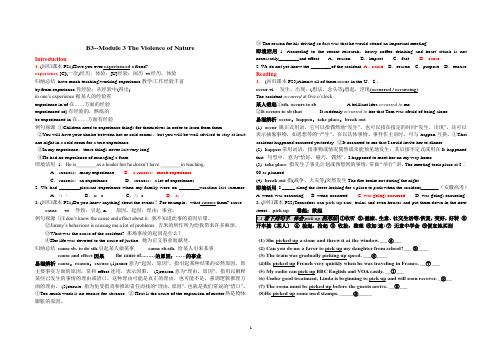
B3--Module 3 The Violence of NatureIntroduction1. (回归课本P21)Have you ever experienced a flood?experience [C](一次)经历,体验;[U]经验;阅历vt.经历,体验归纳总结have much teaching/working experience教学/工作经验丰富by/from experience凭经验;从经验中(得出)in one’s experience据某人的经验看experience in/of在……方面的经验experienced adj.有经验的,熟练的be experienced in在……方面有经验例句探源①Children need to experience things for themselves in order to learn from them.②You will have your choice between hot or cold rooms,but you will be well advised to stay at least one night in a cold room for a true experience.③In my experience,these things never last very long.④He had no experience of managing a farm.即境活用1.He is________as a leader but he doesn’t have ________in teaching.A.success;many experience B.a success;much experienceC.success;an experience D.success;a lot of experiences2. We had ________pleasant experience when my family were on ________vacation last summer.A./;/ B.a;a C./;a D.a;/2. (回归课本P21)Do you know anything about the events?For example,what causes them? causecause vt.导致;引起n.原因,起因;理由;事业;例句探源①I don’t know the cause and effect about it. 我不知道此事的前因后果。
高中英语Module3 The Violence of Nature
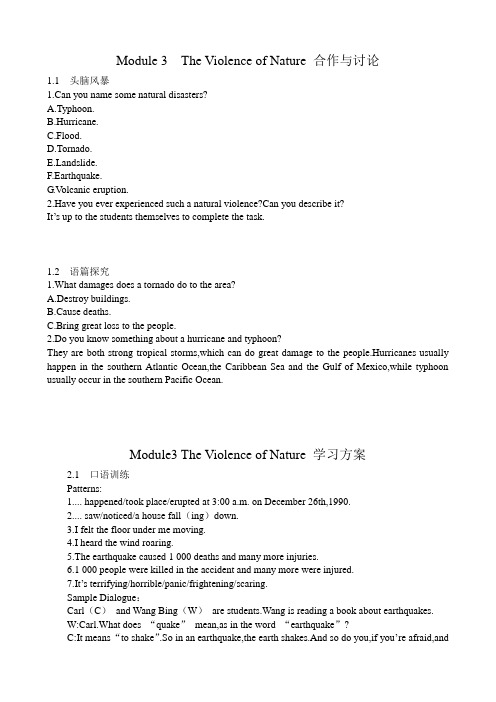
Module 3The Violence of Nature 合作与讨论1.1头脑风暴1.Can you name some natural disasters?A.Typhoon.B.Hurricane.C.Flood.D.Tornado.ndslide.F.Earthquake.G.V olcanic eruption.2.Have you ever experienced such a natural violence?Can you describe it?It’s up to the students themselves to complete the task.1.2语篇探究1.What damages does a tornado do to the area?A.Destroy buildings.B.Cause deaths.C.Bring great loss to the people.2.Do you know something about a hurricane and typhoon?They are both strong tropical storms,which can do great damage to the people.Hurricanes usually happen in the southern Atlantic Ocean,the Caribbean Sea and the Gulf of Mexico,while typhoon usually occur in the southern Pacific Ocean.Module3 The Violence of Nature 学习方案2.1口语训练Patterns:1.... happened/took place/erupted at 3:00 a.m. on December 26th,1990.2.... saw/noticed/a house fall(ing)down.3.I felt the floor under me moving.4.I heard the wind roaring.5.The earthquake caused 1 000 deaths and many more injuries.6.1 000 people were killed in the accident and many more were injured.7.It’s terrifying/horrible/panic/frightening/scaring.Sample Dialogue:Carl(C)and Wang Bing(W)are students.Wang is reading a book about earthquakes.W:Carl.What does “quake”mean,as in the word “earthquake”?C:It means “to shake”.So in an earthquake,the earth shakes.And so do you,if you’re afraid,andif the earthquake’s a big one.W:Were you in San Francisco at the time of the big earthquake in 1989?C:Sure I was.I’ll never forget that.W:What was it like?C:Very strange.It was my first earthquake,you see,and I didn’t know what was happening.First I heard a noise.W:A noise?C:Yes.It sounded like a train that was going under my house.W:What happened next?C:I was in the kitchen cooking something and I felt the floor moving.And then I watched all the glasses that were on the table fall off onto the floor.W:Were you afraid?C:Yes,but not very.It was like being on a boat.The earth shook for quite a while.The house moved and a few pictures fell off the wall,but that was all.2.2写作指导写作技巧对于自然灾害的描述要注意以下几点:1.选取自身的经历或采访目击者,使文章真实生动。
Module 3 The Violence of Nature 语言点(知识梳理)

Module 3 The Violence of Nature 语言点(知识梳理)Module 3 The Violence of Nature 语言点学习目标重点单词occur, strike, experience, cause, ruin, bury, affect, warn重点短语end up, take off, pick up重点句型现在分词短语作结果状语There is /was the possibility of/that...leave+sth.+宾补过去分词做后置定语知识讲解重点单词occur【原句回放】Almost all of them occur in the US, in the area from Texas in the southeast to South Dakota in the north. 几乎所有的龙卷风都发生在美国,从东南部的德克萨斯州到北部的南达科他州。
【点拨】occur vi. 发生,出现;(某想法)出现在脑中,被想到。
occur to(想法念头等)想起,浮互换。
表示“在脑海中出现某种想法”时,要用occur,而不可用happentake place多指有计划、有目的、有步骤地发生,比如举办活动、发生变化等break out 多指自然灾害、战争、某种疾病的突然爆发strike【原句回放】By the late 1890s, he had moved to Galveston, where he died in 1899, a year before the hurricane struck. 到19世纪90年代后期,他移居加尔韦斯顿,并于1899年,即飓风发生的前一年,在那儿去世。
【点拨】strike v.(疾病、灾难)侵袭,爆发;擦(火柴);打,击;给人深刻印象;(时钟)敲响;罢工;突然想起n. 罢工;打击,攻击A big earthquake struck that area in August this year.今年八月一次大地震袭击了那个地方。
外研版高中英语必修3 Module3 The Violence of Nature必考知识点
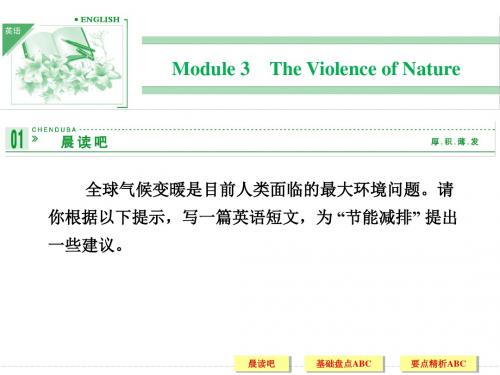
晨读吧
基础盘点ABC
要点精析ABC
【满分作文】 With the development of economy, more and more
greenhouse gases are being discharged into the air.①CO2 makes up about 70% of the greenhouse gases, which is considered to be one of the greatest causes of global warming.②It has harmful effects, causing the sea level to rise and many natural disasters to strike.
晨读吧
基础盘点ABC
要点精析ABC
【高级词汇】 discharge vt. 排放 make up 构成 natural disaster 自然灾害 【佳句变换】 ①CO2 making up around 70% of the greenhouse gases is
considered the first to account for global warming. ②Its harmful effects consist in the sea level to rise and
3.b_u__ry_ vt.埋葬
4.o_c_c_u_rvi.发生
5.s_t_r_ik_e_ vt.& n.(雷电、暴风雨等)袭击
6.r_u_i_nvt.毁坏
7._p_r_e_v_io_u_sadj.以前的
8.d_a_m__a_g_en.& v.损失;损害
9.e_x_p_e_r_i_en__ce_ vt. 经历→e_x_p_e_r_i_e_n_c_ed_ adj.有经验的
新课标外研社版高中英语必修三单元语言点讲解(Module3_The_Violence_of_Nature)

Moduel 3 The Violence of Nature 语言点1.disaster n. 灾害,灾难,不幸a natural disasterWe were all shocked by the disaster. 这场灾难使我们所有人大为震惊。
A disaster movieOur plan ended in disaster. 我们的计划以彻底失败告终。
disastrous adj 灾难性的;损失惨重的a disastrous mistake 招致大祸的错误disastrous results2. flood n.1. 洪水,大水;水灾2.. [the Flood(或Noah's Flood)]灭世洪水(挪亚时期遭受的大洪水)vt.1. 淹没;(雨水)使泛滥;使涨满水;从…中溢出:The river has flooded the meadows.河水淹没了草地。
The river is flooded by the rains.雨水使河水泛滥。
2. (洪水般)淹没;涌至,涌进:roads flooded with cars挤满了汽车的道路3. 充满,充斥;压倒;涌满:Music flooded the room.音乐充满了整个房间。
vi.1. 为水所淹;溢出;(潮水)上涨;泛滥:During spring rains the river floods.在春天的雨季,这条河河水泛滥。
2. (洪水般)流;涌进;充斥:When I drew the curtains back the sunlight flooded in.我拉开窗帘,阳光泻进房间。
Applications flooded in.申请书大量涌来。
3.experience n.1. (个人的)经验;体验2. 阅历(共同的)经历(或遭遇)vt. 1. 有…的经验;感受;遭受;经受,经历;体验:to experience nausea感到晕船to experience pleasure感到愉快2. 发现,通过亲身经历认识到,体验到:I have experienced that the sunrise can be so beautiful.我发现日出真美。
最新-高中英语 Module 3《The Violence of Nature》文
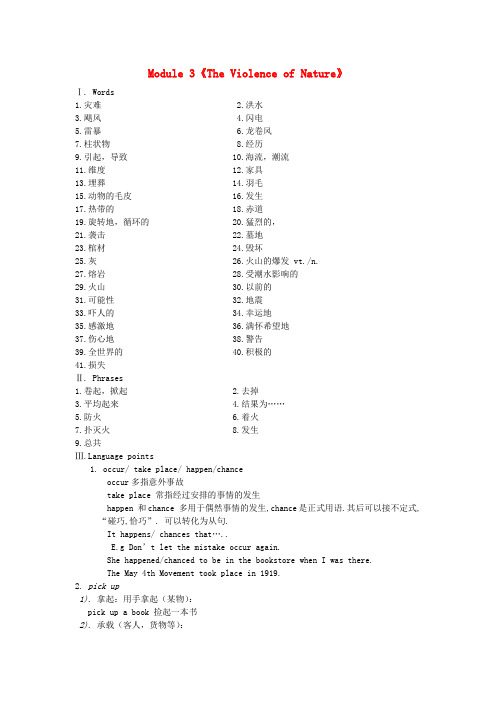
Module 3《The Violence of Nature》Ⅰ. Words1.灾难2.洪水3.飓风4.闪电5.雷暴6.龙卷风7.柱状物 8.经历9.引起,导致 10.海流,潮流11.维度 12.家具13.埋葬 14.羽毛15.动物的毛皮 16.发生17.热带的 18.赤道19.旋转地,循环的 20.猛烈的,21.袭击 22.墓地23.棺材 24.毁坏25.灰 26.火山的爆发 vt./n.27.熔岩 28.受潮水影响的29.火山 30.以前的31.可能性 32.地震33.吓人的 34.幸运地35.感激地 36.满怀希望地37.伤心地 38.警告39.全世界的 40.积极的41.损失Ⅱ. Phrases1.卷起,掀起2.去掉3.平均起来4.结果为……5.防火6.着火7.扑灭火 8.发生9.总共Ⅲ.Language points1. occur/ take place/ happen/chanceoccur多指意外事故take place 常指经过安排的事情的发生happen 和chance 多用于偶然事情的发生,chance是正式用语.其后可以接不定式, “碰巧,恰巧”. 可以转化为从句.It happens/ chances that…..E.g Don’t let the mistake occur again.She happened/chanced to be in the bookstore when I was there.The May 4th Movement took place in 1919.2. pick up1).拿起:用手拿起(某物):pick up a book 捡起一本书2).承载(客人,货物等):The bus picks up commuters at three stops.公共汽车在三个站载送通勤者3).学得:通过学习或经历获得(知识):picked up French very quickly.很快地学起法语来3.on average 平均起来on an average平均, 按平均数计算; 一般地说averageadj.平均的,普通的,平常的, 一般水平的the average age of the boysstudents of average intelligence 普通智力的vt.平均, 均分;求平均值If you average 7, 14 and 6, you get 9.The rainfall averages 800 mm. a year. 平均每年降雨量为800毫米。
高中英语生词巧解(3 Module 3 The Violence of Nature)
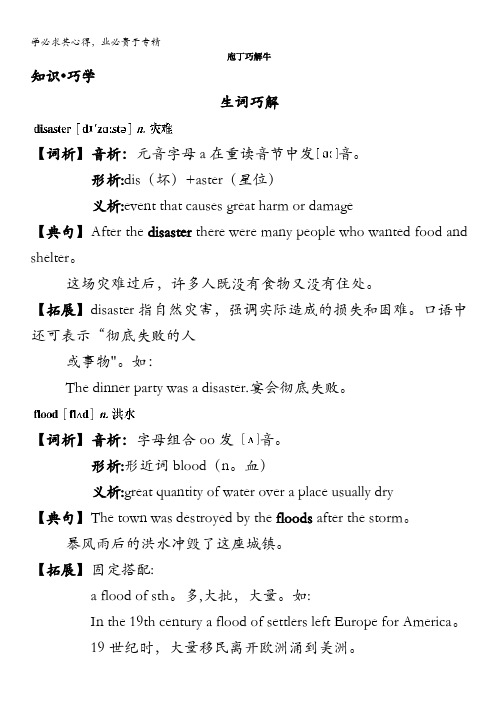
庖丁巧解牛知识•巧学生词巧解【词析】音析:元音字母a在重读音节中发音。
形析:dis(坏)+aster(星位)义析:event that causes great harm or damage【典句】After the disaster there were many people who wanted food and shelter。
这场灾难过后,许多人既没有食物又没有住处。
【拓展】disaster指自然灾害,强调实际造成的损失和困难。
口语中还可表示“彻底失败的人或事物"。
如:The dinner party was a disaster.宴会彻底失败。
【词析】音析:字母组合oo发音。
形析:形近词blood(n。
血)义析:great quantity of water over a place usually dry【典句】The town was destroyed by the floods after the storm。
暴风雨后的洪水冲毁了这座城镇。
【拓展】固定搭配:a flood of sth。
多,大批,大量。
如:In the 19th century a flood of settlers left Europe for America。
19世纪时,大量移民离开欧洲涌到美洲。
in flood(河水)泛滥。
flood.。
.with。
给某人大量的……,大量的……涌向……。
如:The room was flooded with light。
房间一片灯光。
【词析】音析:字母组合mn发[m]音,n不发音.形析:形近词clown(n。
小丑)义析:a tall solid upright post【典句】The temple is supported by massive columns。
此庙由粗大的柱子支撑.【拓展】column既可指高柱,又可指圆柱形物。
还可指(报纸的)专栏(文章)。
- 1、下载文档前请自行甄别文档内容的完整性,平台不提供额外的编辑、内容补充、找答案等附加服务。
- 2、"仅部分预览"的文档,不可在线预览部分如存在完整性等问题,可反馈申请退款(可完整预览的文档不适用该条件!)。
- 3、如文档侵犯您的权益,请联系客服反馈,我们会尽快为您处理(人工客服工作时间:9:00-18:30)。
B3--Module 3 The Violence of NatureIntroduction1. (回归课本P21)Have you ever experienced a flood?experience [C](一次)经历,体验;[U]经验;阅历 vt.经历,体验归纳总结 have much teaching/working experience 教学/工作经验丰富by/from experience 凭经验;从经验中(得出)in one’s experience 据某人的经验看experience in/of 在……方面的经验experienced adj.有经验的,熟练的be experienced in 在……方面有经验例句探源 ①Children need to experience things for themselves in order to learn from them.②You will have your choice between hot or cold rooms ,but you will be well advised to stay at least one night in a cold room for a true experience.③In my experience ,these things never last very long. ④He had no experience of managing a farm.即境活用 1.He is________as a leader but he doesn’t have ________in teaching.A .success ;many experienceB .a success ;much experienceC .success ;an experienceD .success ;a lot of experiences 2. We had ________pleasant experience when my family were on ________vacation last summer. A ./;/ B .a ;a C ./;a D .a ;/ 2. (回归课本P21)Do you know anything about the events ?For example ,what causes them? causecause vt. 导致;引起 n . 原因,起因;理由;事业;例句探源 ①I don’t know the cause and effect about it. 我不知道此事的前因后果。
②Jimmy’s behaviour is causing me a lot of problems. 吉米的所作所为给我带来许多麻烦。
③What was the cause of the accident? 那场事故的起因是什么? ④Her life was devoted to the cause of justice. 她为正义事业而献身。
归纳总结 cause sb. to do sth.引起某人做某事, cause sb.sth. 给某人引来某事,cause and effect 因果, the cause of...……的原因;……的事业易混辨析 cause ,reason ,excuse (1)cause 意为“起因,原因”,指引起某种结果的必然原因,即主要事实方面的原因,常和effect 连用,表示因果。
(2)reason 意为“理由,原因”,指用以解释某些已发生的事情的理由或借口,这种理由可能是真正的理由,也可能不是,强调逻辑推理方面的理由。
(3)excuse 指为免受指责和推卸责任而找的“理由,原因”,也就是我们常说的“借口”。
①Too much work is no excuse for absence. ② Heat is the cause of the expansion of matter.热是物体膨胀的原因。
③ The reason for his driving so fast was that he would attend an important meeting.即境活用1. According to the recent research ,heavy coffee drinking and heart attack is not necessarily________and effect. A .reason B .impact C .fact D .cause2. We do not yet know the ________of the accident. A .cause B .reason C .purpose D .excuseReading1.(回归课本P23)Almost all of them occur in the U .S.,...occur vi. 发生,出现;(想法、念头等)想起,浮现(occurred / occurring)The accident occurred at five o’clock. 某人想起①sth. occurs to sb A brilliant idea occurred to me.②It occurs to sb that It suddenly occurred to her that Tom was afraid of being alone.易混辨析 occur ,happen ,take place ,break out(1)occur 属正式用语,它可以指偶然地“发生”,也可以指在指定的时间“发生,出现”,还可以表示抽象事物,如思想等的“产生”。
在以具体事物、事件作主语时,可与happen 互换。
①Thataccident happened/occurred yesterday. ②It occurred to me that I could invite her to dinner.(2)happen 常用词语,指事物或情况偶然或未能预见地发生;其后接不定式或用在It happened that...句型中,意为“恰好,碰巧,偶然”。
I happened to meet her on my way home.(3)take place 指发生了事先计划或预想到的事情,常做“举行”讲。
The meeting took place at 8∶00 as planned.(4)break out 指(战争、火灾等)突然发生The fire broke out during the night.即境活用 I _____ along the street looking for a place to park when the accident_______.(安徽高考)A. went; was occurring B. went; occurred C. was going; occurred D. was going; occurring 2. (回归课本P23)Tornadoes can pick up cars, trains and even houses and put them down in the next①收听 ②(健康、生意、社交生活等)恢复,变好,好转 ③ 开车接(某人) ④ 捡起,拾起 ⑤ 收拾,整理 ⑥加(速) ⑦ 无意中学会 ⑧便宜地买到(1) She picked up a stone and threw it at the window.___ ④___(2) Can you do me a favor to pick up my daughter from school?___ ③____ (3) The train was gradually picking up speed. ___⑥____(4)He picked up French very quickly when he was traveling in France. __⑦ ___(5) My radio can pick up BBC English and VOA easily. __①___(6) Under good treatment, Linda is beginning to pick up and will soon recover. _②__ (7) The room must be picked up before the guests arrive. __⑤___建议收藏下载本文,以便随时学习!(8)He picked up some used stamps. _____⑧_____①写下,记下②镇压③放下1) put down a rebellion ___②___2) Put down you name and address. _①__3) Put those heavy bags down for a minute. __③___【拓展】put up搭建、举起put on 穿上put off 推迟put out 熄灭put up with 忍受、容忍put forward提出即境活用1.She ________Japanese when she was in Japan. Now she can speak it freely. A.picked out B.made out C.made up D.picked up★2.This picture was taken a long time ago. I wonder if you can________my father.A.find out B.pick out C.look out D.speak out3. They can destroy houses, but leave the furniture inside exactly where it was.(P23)leave + 宾语+宾语补足语“让/使…保持某种状态”。
宾语后接形容词、分词、不定式、介词短语、名词或句子等作补足语。
①Leave the door open and you will breathe fresh air. (leave + object + adj)②Don’t leave me waiting outside too long.③The bad weather left the project half finished.④Ted’s parents went abroad and left him in the care of his grandmother.⑤His parents both died last year, leaving him an orphan.⑥What we’ve done leaves much to be desired.即境活用1.You’d better not leave the medicine________kids can get at it.A.even if B.which C.where D.so that2.—Was the problem solved at the meeting? —Not yet. I’m afraid it may lead to more serious ones if________unsolved. A.making B.remained C.left D.taking4.On average, there are 800 tornadoes in the US each year,causing about 80 deaths and 1,500 injuries.on average 平均,平均起来On average, there are twenty boys present every day.It takes me a week to read a book, on average.causing about 80 deaths and 1,500 injuries.是现在分词短语作结果状语。
